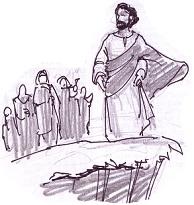

“Where did this man get all this?” (Mark 6:2).
Heb 12:4-7, 11-15’ Mark 6:1-6
In Mark’s Gospel, Jesus is well into his ministry before he visits his hometown of Nazareth. We note in 1:24 that the unclean spirit he encounters in the synagogue in Capernaum shrieks at him “Jesus of Nazareth,” before being expelled. In 3:31, Jesus’ family hears of his fame and the controversies surrounding him, and they come from Nazareth to take charge of him because they thought he was “out of his mind.”
In today’s Gospel from 6:1, Jesus and his disciples go to Nazareth, where his family and neighbors are astonished that one of their own, a simple carpenter well known to everyone, is somehow now a brilliant teacher and miracle worker. They are incredulous, prompting Jesus to quote the adage, “A prophet is not without honor except in his native place.” Their lack of faith prevents Jesus from performing many healings there.
The story defies the traditional homecoming welcome politicians love to stage by going home to announce their candidacies and tout their humble roots. Jesus ends up disappointing and even alienating his own kin and the local crowd by becoming such a phenomenal success after what appears to have been a totally lackluster, “hidden” life among them up until then. So, Jesus begins his public ministry as too good to be true in his hometown and under heavy suspicion from the official religious authorities everywhere else.
Jesus is the victim of a cruel dynamic not unknown to modern culture, to create and destroy celebrities and heroes by praising their talents, then proving they had tragic flaws and faults just like the rest of us. They serve as scapegoats for our collective cynicism, which punishes anyone who dares to exceed our normal expectations of achievement. The same crowd that welcomed Jesus to Jerusalem waving palms lined the streets to jeer at him on his way to the cross.
Jesus’ experience of the struggles going on in our wounded psyches was part of the Incarnation. As fully human, he knew both the wonders and distortions inherent in human nature. Every healing and exorcism along the way added weight to the cross he carried to defeat sin and death. This is a great mystery, but it is inseparable from our hope for redemption in Jesus. We die with him in order to rise with him. What happened to Jesus is part of our own discipleship. The author of Hebrews may have been grappling with this when he wrote:
Endure your trials as discipline; God treats you as his children.
For what "son” is there whom his father does not discipline?
At the time, all discipline seems a cause not for joy but for pain,
yet later it brings the peaceful fruit of righteousness to those who are trained by it (Heb 12:6).
Advertisement








